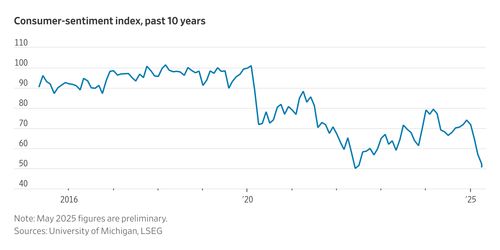US consumer sentiment slumps, households brace for inflation surge


The index of consumer sentiment dropped to 50.8, down from 52.2 in April, in the preliminary reading for May. That is the second-lowest reading on record, behind June 2022. The outlook for price changes also moved in the wrong direction. Year-ahead inflation expectations rose to 7.3% from 6.5% last month, while long-term inflation expectations ticked up to 4.6% from 4.4%. However, the majority of the survey was completed before the U.S. and China announced a 90-day pause on most tariffs between the two countries. The trade situation appears to be a key factor weighing on consumer sentiment.

U.S. consumer sentiment fell slightly in May for the fifth straight month, surprising economists, as Americans increasingly worry that President Donald Trump’s trade war will worsen inflation. The preliminary reading of the University of Michigan’s closely watched consumer sentiment index, released Friday, declined 2.7% on a monthly basis to 50.8, the second-lowest level in the nearly 75-year history of the survey. The only lower reading was in June 2022. Since January, sentiment has tumbled nearly 30%. Americans have largely taken a sour view about where the economy is headed in the wake of the Trump administration’s imposition of huge import duties, which threaten to slow growth and push up prices.

Consumer sentiment unexpectedly worsened in recent weeks, while inflation expectations jumped, new data from the University of Michigan showed. "Tariffs were spontaneously mentioned by nearly three-quarters of consumers, up from almost 60% in April; uncertainty over trade policy continues to dominate consumers’ thinking about the economy," said Joanne Hsu, the survey's director. The widely watched sentiment index stood at 50.8, according to a preliminary reading for May. Economists polled by The Wall Street Journal had expected a reading of 53.5. The gauge had already crashed to 52.2 in April, with record-low levels recorded for Democrats and independents.











